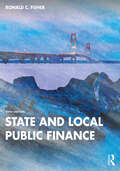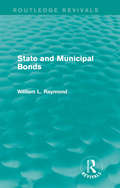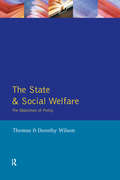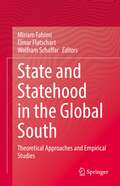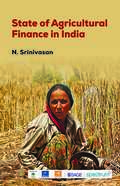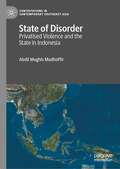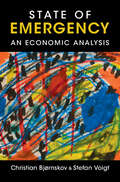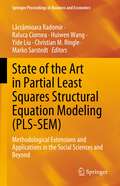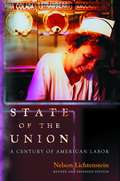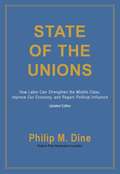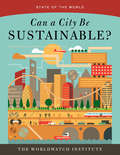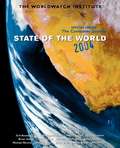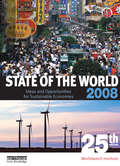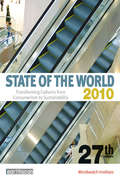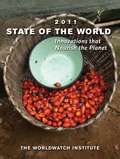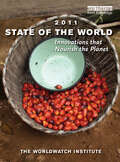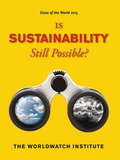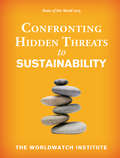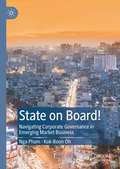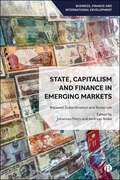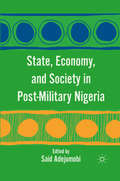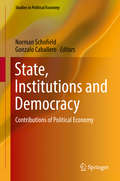- Table View
- List View
State and Local Public Finance
by Ronald C. FisherState and Local Public Finance provides a comprehensive and sophisticated analysis of state and local government public finance practices and issues, using the basic tools of economics. This fifth edition maintains its focus on key local services such as education, health care, and transportation and brings in new coverage of land use and housing, applications from behavioral economics, and more international comparisons. This textbook provides an examination and analysis of public finance practices and problems in a federal fiscal system, focusing on the fiscal behavior and policies of state and local governments. Modern economic theory is applied to examine the way key institutions are used to produce and finance services and to provide evaluation of alternative policies. This stalwart text will continue to be invaluable reading for those who study public finance, local government finance, urban economics, public policy, and public administration.
State and Municipal Bonds (Routledge Revivals)
by William L. RaymondWith twenty-one years’ experience in the investment bond business, Raymond uses his experience in this study to demonstrate the key issues related to state, county, municipal and district bonds through the use of the most recent data of the time. Originally published in 1923, this version was republished in 1936 to ensure that all figures and arguments were up-to-date. This title will be of interest to students of Business, Economics and Finance.
State and Social Welfare, The: The Objectives of Policy (Routledge Studies In The Political Economy Of The Welfare State Ser.)
by Thomas Dorothy WilsonAims to review the issues raised by the state provision of social benefits and to examine the principles on which their provision may be deemed to rest.
State and Statehood in the Global South: Theoretical Approaches and Empirical Studies
by Miriam Fahimi Elmar Flatschart Wolfram SchaffarThis book focuses on critical approaches to the state and state theory in the Global South. In light of the reemergence of the post-colonial and peripheral state as a crucial institution and actor in the 21st century’s capitalist world-system, the book examines the nature, functions and development dynamics of the state in the periphery, as well as its constituting interests and struggles. Drawing on the works of Poulantzas and Gramsci, dependency and world-systems theory, as well as the regulation school and the German Ableitungsdebatte, stategraphy and critical realism, it analyzes the development of different theoretical perspectives on the state, elaborates on their theoretical, ontological and epistemological presuppositions, and illustrates their methodological, practical and ethical implications. The book is divided into three parts, the first of which provides an overview of recent global capitalist developments and challenges for state theory and lays the theoretical, ontological and hermeneutic foundation for studies of the state and statehood in the Global South. In turn, the second part introduces readers to different schools of state theory, including critical theory and materialism, as well as approaches derived from postcolonial, anthropological, and feminist thought. Lastly, the third part presents various empirical studies, highlighting concrete methodological and practical experiences of conducting critical state theory.
State of Agricultural Finance in India
by N SrinivasanAgricultural finance has come a long way in the past 15 years. After the concerted efforts of GOI, supported by RBI and NABARD, towards doubling of agricultural credit flow in 2004-2005, the growth in credit flow to the sector has been robust with an impressive CAGR of 18% between 2004--2005 and 2019-2020. While outreach increased, the Terms of Trade (Farmers and Non-farmers) has largely been on a declining trend, reflecting the underlying stressed conditions in farming. There is a challenge of inclusion, where small and marginal farmers continue to struggle for suitable and affordable credit products and access. This book summarizes the current state of agricultural finance in India, highlighting policy blind spots and grey areas. It documents the important advancements made in the agri-finance space in the last few years. The book covers various aspects of Agri-Finance Policy; institutional appetite and architecture for agriculture credit; formal financial services for enterprises in agriculture; agri-business, including FPOs; and innovations in credit, insurance, delivery mechanisms for agri-sector.
State of Charge: The Massachusetts Energy Storage Initiative
by John R. Wells Benjamin WeinstockIn early 2017, Judith Judson (Harvard Business School MBA, 2000), Commissioner of the Massachusetts Department of Energy Resources (DOER), was reflecting on the results of the initiative she had led to identify the contribution advanced electricity storage could make to electricity generation and distribution in the Commonwealth of Massachusetts. The study was the first major output from the $10 million Energy Storage Initiative (ESI) launched by Massachusetts Governor Charlie Baker's administration in May 2015. The advanced simulation techniques employed in the study indicated that over a ten-year period, the optimal deployment of storage capacity would cut the cost of electricity for consumers in the Commonwealth by $230 million per year, deliver $110 million in annual revenues for storage providers, and reduce CO2 emissions by 100,000 tons a year, the equivalent of taking 22,000 cars off the road. Moreover, neighboring states would benefit from $250 million in lowered wholesale prices. To deliver these benefits, 1.77 GWh of advanced storage would be required across the grid, costing between $970 million and $1.35 billion. Incorporating the perspectives of a wide body of stakeholders (from utilities to municipalities to generators), the study wound up recommending a suite of policies that would facilitate the installation of 600 MWh of storage capacity by 2025, representing about 6 minutes of the state's daily electricity consumption and delivering $800 million in benefits to ratepayers. It would also make the Commonwealth a leader in advanced storage technology and deliver substantial greenhouse gas reductions. At the end of 2015 according to figures from the Department of Energy, Massachusetts ranked 23rd in the United States in energy storage deployment, well behind the leader Arizona, with nearly 300 MWh, and Texas, with over 150 MWh.
State of Disorder: Privatised Violence and the State in Indonesia (Contestations in Contemporary Southeast Asia)
by Abdil Mughis MudhoffirThis book examines the theme of privatised violence in different political settings by focusing on the Indonesian case. It argues that the persistence of privatised violence is not solely related to the historical formation of the institutions of state power and authority; it is also intricately related to predatory forms of capitalist development. Within such contexts, privatised violence is not an obstruction, but instrumental for the capital accumulation process, constituting a state of disorder. The book contributes to understanding not only Indonesia’s privatised violence but also the nature of Indonesian politics and the state.
State of Emergency: An Economic Analysis
by Stefan Voigt Christian BjørnskovNine out of ten constitutions contain explicit emergency provisions. During the pandemic, half of the governments with such constitutions has made use of these provisions by declaring a state of emergency. State of Emergency is the first book to analyse the factors that lead to such provisions being included in newly drafted constitutions. It explores their use – as well as their misuse – and explains the effects that using emergency provisions has. Declaring a state of emergency is particularly challenging in federally constituted states as it endangers the balance of powers between the federal level and the states. This book, therefore, pays special attention to this topic. Focusing on two of the most important recent cases relating to emergency provisions: the Covid-19 pandemic and acts of terrorism, this book uses numerous examples to analyse emergency provisions with a rigorous empirical approach.
State of South Carolina
by Mark Mitchell Randolph B. CohenThis case presents the managerial dilemma faced by the treasurer of South Carolina in 1998. Until last year, the South Carolina state pension fund (with over $17 billion in assets) was barred by the state constitution from investing in equities. After the constitution was amended, the state government had to decide how much to invest in equities and what assets to choose. Using domestic and international data, the concepts of standard deviation, correlation, covariance, diversification, and risk are introduced. Additionally the case looks at the equity premium from a global setting. This case covers two days and will be used early in the Risk and Return module, just before the introduction of the CAPM.
State of the Art in Partial Least Squares Structural Equation Modeling: Methodological Extensions and Applications in the Social Sciences and Beyond (Springer Proceedings in Business and Economics)
by Yide Liu Marko Sarstedt Christian M. Ringle Huiwen Wang Lăcrămioara Radomir Raluca CiorneaThis edited volume brings together some of the best papers from the 2022 Conference on Partial Least Squares Structural Equation Modeling (PLS-SEM), held at the Babeș-Bolyai University, Cluj, Romania. The volume seeks to expand the current research on PLS-SEM and promote the method’s application in the scientific community. It gathers research from scholars in many different fields who work on the advancement of PLS-SEM and who apply the method to explain and predict behavioral phenomena. Researchers today can draw on a wide array of different PLS-SEM-based algorithms, complementary methods, and model evaluation metrics. Tying in with these developments, the first part of this book documents methodological advances of PLS-SEM, which extend the researchers’ current toolbox of methods. The following parts demonstrate state-of-the-art applications of PLS-SEM in various fields such as consumer behavior, hospitality, human resource management, entrepreneurship, and organizational behavior. Special emphasis is placed on studies that apply complementary methods to offer a more nuanced analysis of the research questions.
State of the Union: A Century of American Labor - Revised and Expanded Edition (Politics and Society in Modern America #91)
by Nelson LichtensteinIn a fresh and timely reinterpretation, Nelson Lichtenstein examines how trade unionism has waxed and waned in the nation's political and moral imagination, among both devoted partisans and intransigent foes. From the steel foundry to the burger-grill, from Woodrow Wilson to John Sweeney, from Homestead to Pittston, Lichtenstein weaves together a compelling matrix of ideas, stories, strikes, laws, and people in a streamlined narrative of work and labor in the twentieth century.The "labor question" became a burning issue during the Progressive Era because its solution seemed essential to the survival of American democracy itself. Beginning there, Lichtenstein takes us all the way to the organizing fever of contemporary Los Angeles, where the labor movement stands at the center of the effort to transform millions of new immigrants into alert citizen unionists. He offers an expansive survey of labor's upsurge during the 1930s, when the New Deal put a white, male version of industrial democracy at the heart of U.S. political culture. He debunks the myth of a postwar "management-labor accord" by showing that there was (at most) a limited, unstable truce.Lichtenstein argues that the ideas that had once sustained solidarity and citizenship in the world of work underwent a radical transformation when the rights-centered social movements of the 1960s and 1970s captured the nation's moral imagination. The labor movement was therefore tragically unprepared for the years of Reagan and Clinton: although technological change and a new era of global economics battered the unions, their real failure was one of ideas and political will. Throughout, Lichtenstein argues that labor's most important function, in theory if not always in practice, has been the vitalization of a democratic ethos, at work and in the larger society. To the extent that the unions fuse their purpose with that impulse, they can once again become central to the fate of the republic. State of the Union is an incisive history that tells the story of one of America's defining aspirations.This edition includes a new preface in which Lichtenstein engages with many of those who have offered commentary on State of the Union and evaluates the historical literature that has emerged in the decade since the book's initial publication. He also brings his narrative into the current moment with a final chapter, "Obama's America: Liberalism without Unions.?
State of the Unions
by Philip M. DineAfter years of being ignored by the media and public, labor finds itself squarely in the spotlight - under attack from all angles and fighting back fiercely. No longer can anyone claim that labor's falling membership has made it a mere relic, for its adversaries would not expend so much energy to destroy a movement grown truly irrelevant. But what is this war on labor all about? Can unions survive, and how? And what are the stakes for the middle class and for our country?With the benefit of 25 years of award-winning reporting, Philip M. Dine takes us on a riveting journey - replete with colorful characters and penetrating analysis - that answers these questions. It places today's news in context while making a powerful argument that a reinvigorated labor movement and a strong middle class are inextricably linked."Phil Dine offers an insightful, riveting, reader-friendly examination of organized labor..."- Alexis Herman, 23rd U. S. Secretary of Labor"...a thoughtful work that gives readers hope that America's working class can regain the strength and respect they rightfully deserve."- American Prospect"...a must read...keen observations and thoughtful conclusions...so well written and entertaining, it beckons anyone who works for a living to bring it to thebeach."- Linda Foley, Past President, The Newspaper Guild"If you'd like to understand where the jobs have gone, and why, and what can be done to stop the bleeding - it's worth reading Philip M. Dine's analysis of what's happened to unions in the last three decades..."- Sacramento News & Review"One of the best books in years about the union movement, its strengths, its weaknesses and its pivotal importance for America's middle class....(Dine) tells fascinating stories few knew."- AFL-CIO"Phil Dine offers a compelling and provocative look at labor's role in the political, social and economic marketplace."- The Honorable Tom Ridge"Phil Dine gives an intriguing new perspective on labor's declining numbers and the ill effects for our country if we let this trend continue."- Donna Brazile, Commentator, CNN and ABC News "...State of the Unions shatters conventional wisdom..."- St. Louis Post-Dispatch"State of the Unions does a masterful job of...showing how labor can revitalize itself so it is in a position to tackle the problems."-Congressman Chris Van Hollen (D-Md.)"State of the Unions should be of great interest to labor leaders, scholars and students, as well as citizens concerned about the future of our democracy."- Richard Hurd, Professor of Labor Studies, Cornell University"When I read Phil Dine's account of the largest strike by black workers in Mississippi's history, I was swept back to the summer of 1990 standing in a cotton field in Indianola, Mississippi...Phil Dine tells their story as no one else can."- G. Neel Lattimore, former Press Secretary to First Lady Hillary Rodham Clinton
State of the World (State of the World)
by The Worldwatch The Worldwatch InstituteCities are the world's future. Today, more than half of the global population--3. 7 billion people--are urban dwellers, and that number is expected to double by 2050. There is no question that cities are growing; the only debate is over how they will grow. Will we invest in the physical and social infrastructure necessary for livable, equitable, and sustainable cities?In the latest edition of State of the World, the flagship publication of the Worldwatch Institute, experts from around the globe examine the core principles of sustainable urbanism and profile cities that are putting them into practice. State of the World first puts our current moment in context, tracing cities in the arc of human history. It also examines the basic structural elements of every city: materials and fuels; people and economics; and biodiversity. In part two, professionals working on some of the world's most inventive urban sustainability projects share their first-hand experience. Success stories come from places as diverse as Ahmedabad, India; Freiburg, Germany; and Shanghai, China. In many cases, local people are acting to improve their cities, even when national efforts are stalled. Parts three and four examine cross-cutting issues that affect the success of all cities. Topics range from the nitty-gritty of handling waste and developing public transportation to civic participation and navigating dysfunctional government. Throughout, readers discover the most pressing challenges facing communities and the most promising solutions currently being developed. The result is a snapshot of cities today and a vision for global urban sustainability tomorrow.
State of the World 2004
by Linda StarkeIt focuses on consumption-one of the most central and also one of the most neglected elements in the global search for a sustainable future.
State of the World 2008: Ideas and Opportunities for Sustainable Economies
by Worldwatch InstituteThe environmentalist's bible' Times Higher Education Supplement. 'Essential reading' The Good Book Guide. 'The most comprehensive, up-to-date, and accessible summaries ... on the global environment' E. O. Wilson, Pulitzer Prize winner. Celebrating its 25th year of publication, State of the World 2008 suggests that something huge and even revolutionary is struggling to be born as policymakers, business leaders and others around the globe create the architecture of sustainable economies. Featuring chapters on renewable energy, innovations in clean production, commons resources, trade policy, finance for sustainability, new economic yardsticks, and many other topics, State of the World 2008 is the first global-level publication to showcase a wide range of diverse innovations and to demonstrate their near-term potential to put whole societies on a sustainable path. Published annually in 28 languages, State of the World is relied upon by national governments, UN agencies, development workers and law-makers for its authoritative and up-to-the-minute analysis and information. It is essential for anyone concerned with building a positive, global future.
State of the World 2010: Transforming Cultures from Consumerism to Sustainability
by Worldwatch InstituteMany of the environmental and social problems we face today are symptoms of a deeper systemic failing: a dominant cultural paradigm that encourages living in ways that are often directly counter to the realities of a finite planet. This paradigm, typically referred to as 'consumerism,' has already spread to cultures around the world and has led to consumption levels that are vastly unsustainable. If this pattern spreads further there will be little possibility of solving climate change or other environmental problems that are poised to dramatically disrupt human civilization. It will take a sustained, long-term effort to redirect the traditions, social movements and institutions that shape consumer cultures towards becoming cultures of sustainability. These institutions include schools, the media, businesses and governments. Bringing about a cultural shift that makes living sustainably as 'natural' as a consumer lifestyle is today will not only address urgent crises like climate change, it could also tackle other symptoms like extreme income inequity, obesity and social isolation that are not typically seen as environmental problems. State of the World 2010 paints a picture of what this sustainability culture could look like, and how we can - and already are - making the shift.
State of the World 2011: Innovations That Nourish the Planet
by Worldwatch Institute StaffKnown for tackling the most pressing issues that face our world, the Worldwatch Institute has dedicated the 2011 edition of its flagship report to a compelling look at the global food crisis, with particular emphasis on what innovators globally can do to help solve a worldwide problem. State of the World 2011 not only introduces us to the latest agro-ecological innovations and their global applicability but also gives broader insights into issues including poverty, international politics, and even gender equity. Written in clear, concise language, with easy-to-read charts and tables, State of the World 2011, produced with support from the Bill and Melinda Gates Foundation, provides a practical vision of the innovations that will allow billions of people to feed themselves, while restoring rural economies, creating livelihoods, and sustaining the natural resource base on which agriculture depends.
State of the World 2011: Innovations that Nourish the Planet
by Worldwatch InstituteOver the last two years, Worldwatch's Nourishing the Planet team has travelled to 25 sub-Saharan African nations - the places where hunger is greatest - and uncovered a treasure trove of innovations from farmers groups, private voluntary organizations, universities, and even agribusiness companies. These innovations offer global benefits - from the continent's role in preventing disastrous climate change to the way urban farmers are feeding people in cities and why even determined locavores are sustained by the crop diversity preserved by farmers thousands of miles away. This book assesses the state of agricultural innovations from cropping methods to irrigation technology to agricultural policy with an emphasis on sustainability, diversity, and ecosystem health in the hope of guiding governments, foundations, and concerned citizens in their efforts to eradicate hunger and poverty. Published annually in 28 languages, State of the World is long established as the most authoritative and accessible annual guide to our progress towards a sustainable future. It is relied upon by national governments, UN agencies, development workers and law-makers for its up-to-the-minute analysis and information.
State of the World 2013
by Worldwatch InstituteEvery day, we are presented with a range of "sustainable" products and activities--from "green" cleaning supplies to carbon offsets--but with so much labeled as "sustainable," the term has become essentially sustainababble, at best indicating a practice or product slightly less damaging than the conventional alternative. Is it time to abandon the concept altogether, or can we find an accurate way to measure sustainability? If so, how can we achieve it? And if not, how can we best prepare for the coming ecological decline? In the latest edition of Worldwatch Institute's State of the World series, scientists, policy experts, and thought leaders tackle these questions, attempting to restore meaning to sustainability as more than just a marketing tool. In State of the World 2013: Is Sustainability Still Possible?, experts define clear sustainability metrics and examine various policies and perspectives, including geoengineering, corporate transformation, and changes in agricultural policy, that could put us on the path to prosperity without diminishing the well-being of future generations. If these approaches fall short, the final chapters explore ways to prepare for drastic environmental change and resource depletion, such as strengthening democracy and societal resilience, protecting cultural heritage, and dealing with increased conflict and migration flows. State of the World 2013 cuts through the rhetoric surrounding sustainability, offering a broad and realistic look at how close we are to fulfilling it today and which practices and policies will steer us in the right direction. This book will be especially useful for policymakers, environmental nonprofits, and students of environmental studies, sustainability, or economics.
State of the World 2013: Is Sustainability Still Possible?
by The Worldwatch InstituteEvery day, we are presented with a range of "sustainable" products and activities--from "green" cleaning supplies to carbon offsets--but with so much labeled as "sustainable," the term has become essentially sustainababble, at best indicating a practice or product slightly less damaging than the conventional alternative. Is it time to abandon the concept altogether, or can we find an accurate way to measure sustainability? If so, how can we achieve it? And if not, how can we best prepare for the coming ecological decline? In the latest edition of Worldwatch Institute's State of the World series, scientists, policy experts, and thought leaders tackle these questions, attempting to restore meaning to sustainability as more than just a marketing tool. In State of the World 2013: Is Sustainability Still Possible?, experts define clear sustainability metrics and examine various policies and perspectives, including geoengineering, corporate transformation, and changes in agricultural policy, that could put us on the path to prosperity without diminishing the well-being of future generations. If these approaches fall short, the final chapters explore ways to prepare for drastic environmental change and resource depletion, such as strengthening democracy and societal resilience, protecting cultural heritage, and dealing with increased conflict and migration flows. State of the World 2013 cuts through the rhetoric surrounding sustainability, offering a broad and realistic look at how close we are to fulfilling it today and which practices and policies will steer us in the right direction. This book will be especially useful for policymakers, environmental nonprofits, and students of environmental studies, sustainability, or economics.
State of the World 2015
by The Worldwatch The Worldwatch InstituteWe think we understand environmental damage: pollution, water scarcity, a warming world. But these problems are just the tip of the iceberg. Food insecurity, financial assets drained of value by environmental damage, and a rapid rise in diseases of animal originare among the underreported consequences of an unsustainable global system. In State of the World 2015, the flagship publication of The Worldwatch Institute, experts explore hidden threats to sustainability and howto address them. How will nations deal with migration as climate change refugees cross borders in order to escape flooding, drought, or other extreme weather events? What will happen to the price and availability offossil energy--the foundation of industrial civilization--as these resources oscillate between surplus and scarcity? If perpetual economic growth on a finite planet is impossible, what are the alternatives? Can national governments manage the transition?Eight key issues are addressed in depth,along with the central question ofhow we can develop resilience to these and other shocks. For decades, The Worldwatch Institute has been a leader in identifying and analyzing emerging environmental threats. With the latest edition of State of The World, the authorities at Worldwatch bring to light challenges we can no longer afford to ignore.
State on Board!: Navigating Corporate Governance in Emerging Market Business
by Nga Pham Kok-Boon OhResearch in this book focuses on the strategic behaviour of the State as a shareholder in businesses, and the implications it has for the other shareholder(s) and business performance. It investigates the institutional characteristics of State-linked and State-owned firms (SIEs & SOEs), in emerging markets using Vietnam as a case study with comparative analysis on China and selected ASEAN countries.In doing so, the book adopts an evidence-based approach to explain the State’s role as a shareholder in the different aspects of corporate governance, including CEO appointment, board structure and impact of State ownership on business strategy and performance. It highlights the influence of the State as a shareholder by investigating institutional factors consistent with “path dependence” theory, which postulates that the initial and underlying structure of an economy influences its performance. In addition, the book presents empirical evidence of the dynamics of corporate governance arising from interactions between the State and other shareholders, which has not yet been addressed in the literature, and is distinctive in providing new insights from both qualitative and empirical research on how to successfully navigate the emerging market business environments from the perspective of the State as an “owner-participant”. Explaining the theoretical constructs in corporate governance in State-invested firms, empirical research methodologies, and results to draw and validate inferences, the book is comprehensive and provides a practical guide for practitioners as well as a reference for academics, undergraduate and postgraduate students. The new theoretical models proposed integrate traditional political-economic and agency theories, which also underpin tertiary business courses and academic research.
State, Capitalism, and Finance in Emerging Markets: Between Subordination and Statecraft (Business, Finance and International Development)
by Johannes Petry and Andreas NölkeWhat role do emerging markets play in the global financial system? Are they subordinated within global financial hierarchies? Or do they have autonomy, even power, to use finance to pursue state objectives? In this edited volume, leading scholars explore these questions, focusing on state–finance interactions globally. The book combines literatures on international financial subordination, financial statecraft and comparative capitalism to analyse state–finance relationships in emerging markets, particularly the BRICS: Brazil, Russia, India, China, and South Africa. It reveals that these states can control their domestic financial sectors despite global subordination, though their ability to do so varies significantly. This essential volume offers profound insights into how emerging markets are reshaping global finance for scholars and policy makers.
State, Economy, and Society in Post-Military Nigeria
by Said AdejumobiThis book analyzes how neo-liberal state economic policies and political reforms have impacted on state-society relations, economic and class configurations, social composition of power, social welfare and cohesion in post-military Nigeria; and points to key policy recommendations that may be crucial in redirecting the future of the country.
State, Institutions and Democracy
by Norman Schofield Gonzalo CaballeroThis book presents a set of original and innovative contributions on state, institutions and democracy in the field of political economy. Modern political economy has implied the interaction between politics and economics to understand political, electoral and public issues in different nations, and in this volume a group of leading political economists and political scientists from Europe, America and Asia provides theoretical advances, modelling and case studies on main topics in political economy. The analysis of the role and performance of politics and democracy in diverse nations implies the study of the organization of the state, lobbying, political participation, public policies, electoral politics, public administration and the provision of public services. This book provides advances in the research frontier of these topics and combines historical evidence, institutional analysis, mathematical models and empirical analysis in an interdisciplinary approach. Political and social scientists, economists and those interested in the performance of states, democracy and elections can find new research results in this volume.
